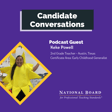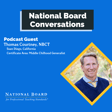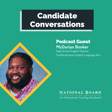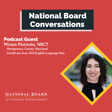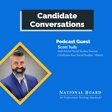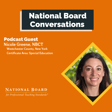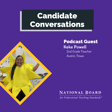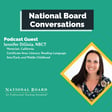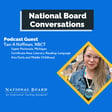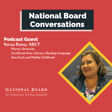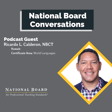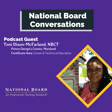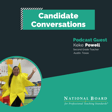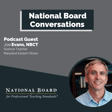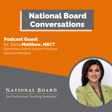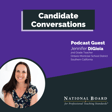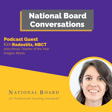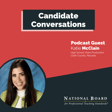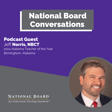Become a Creator today!Start creating today - Share your story with the world!
Start for free
00:00:00
00:00:01

Jose Vilson - CoFounder EduColor
Jose Vilson, NBCT, joins the podcast to discuss his National Board journey, and the work he is doing with his organization EduColor
Transcript
Podcast Introduction
00:00:00
Speaker
Hey, everyone. Welcome back to National Board Conversations. This season on the podcast, I'm trying to take you more inside the organization and see what education leaders affiliated with the National Board are doing to push education forward.
Meet Jose Wilson
00:00:11
Speaker
On this episode, I have the pleasure of speaking with Jose Wilson. He's a National Board Certified Teacher in New York City, the Executive Director and Co-Founder of Educolor, an organization that amplifies the works and ideas of students, educators, and communities of color through supportive networks and professional development.
Jose's Journey and Educolor's Mission
00:00:28
Speaker
We talked to Jose about his national board journey, talk about the founding of Educolor and the work the organization is doing to advance education, and talk about ways to recruit and retain teachers of color in the profession. I hope you enjoyed this conversation and get something out of it. Here's my conversation with Jose Wilson. Welcome to the show, Jose. Thank you for joining me. Thank you for having me.
00:00:51
Speaker
All right, so we're gonna get straight into it.
Jose's Personal Interests
00:00:53
Speaker
If you can give a quick introduction to yourself, what's your current role, a brief intro, and then I got three questions. What's your three favorite foods, the last three songs on your title playlist because you're a title guy, and the one sports team ahead of your heart, and if not sports, a movie you can recite line for line. So let's go. Okay, I guess I should start from the
Teaching Experience and Academic Pursuits
00:01:16
Speaker
top. My name is Jose Wilson. I was a long time veteran educator, 15 years.
00:01:21
Speaker
national board certified. In addition, I'm on the national board of the national board. And I also have a prominent role as the executive director of EDU Color, an organization dedicated to race and social justice issues. Last but certainly not least, I am a doctoral student at Teachers College, Columbia University studying sociology and education. In other words, I have a lot of hats. Yeah, man, you got a lot going on. Shout out to you.
00:01:52
Speaker
All right, so what are your three favorite foods? OK, I'm going to start from ST. How about some baked chicken with white rice and red beans? I respect it. How special fried rice would be number two? And I can deal with that. Let's go with.
00:02:19
Speaker
some good chicken wings with pork fried rice. Oh, man. Nice. I don't have that one all that often though. It's a special occasion, man. You got to keep your favorites for special occasions sometimes. That's right. All right, so the last three songs on your title. Oh, that's a great question. I'm going to ignore Beyonce for now because she's been taking over my whole joint. She just dropped a new album, you know?
00:02:47
Speaker
Yeah, I've listed the album about 10 times straight through, no skips. Oh, man. So let's see. I would say, you could do Drake's Massive. That was the one bop on that album. Didi me pregunto by Bad Bunny. Yeah. Say a cabo by the Beat Nuts. So I'm kind of all over the place. Are you all over the place? Nice. Yeah.
00:03:15
Speaker
All right, so you got a sports team that got your heart or a movie that you can recite line for line? I have two teams that have my heart. And you can imagine why. Number one, the New York Yankees. And of course, on the opposite side of that would be the Knicks. Yeah, that.
00:03:37
Speaker
I love the young guys though, they're doing something. I tell a lot of people that don't understand like the Knicks have a stranglehold on New York City. Like some people don't understand how much the stranglehold the Knicks have on New York City. I've been trying to explain, listen, the Nets might think they doing something, but they never gonna be, if the Knicks, like once the Knicks are good, it's a wrap for every other team for the most part except the Yankees. Yeah, basically, people don't get that, they'll be all right though.
00:04:05
Speaker
All right, so let's get
From Tech to Teaching: Jose's Motivation
00:04:06
Speaker
into it. Can you share why you ended up becoming a teacher and what pushed you to become a math teacher while you was in the classroom? It's funny, because I think about the story a lot. It really, I want to say, started at Syracuse University. I was studying to become a computer scientist and try to become a video game programmer. But at some point, through a lot of my activism and other things that were happening, I said,
00:04:31
Speaker
What's the one way that I can affect change for children and make sure that they have a door like this open to them? And of course, I said, OK, I could do high school math teaching. But then I was like, how can I also affect dropout rates? Because I was also really prominent in the news when I was in school. And I said, I can hear them at the dropout rate.
00:04:52
Speaker
was the one grade I know where I can at least potentially be a stopgap for my students. So I jumped into middle school math teaching and I did that for 15 years. It was an honor and a pleasure to serve a thousand plus students. Oh man, that's amazing. Thank you. What did you enjoy most about being a teacher?
00:05:12
Speaker
I would say just the randomness of the moment. And people don't get this, but let's say I did not have a lesson plan, hypothetically. I know we're not supposed to talk about this on the National Board podcast. National Board certified. That's not supposed to happen, man.
00:05:30
Speaker
Let's say hypothetically that didn't happen. I mean, of course I had one, but let's say hypothetically, right? You still need to be prepared for the unknown. You still have to be nimble. You still have to have things that allow for you to navigate the classroom
00:05:47
Speaker
and allow you to be kind of like one with the classroom and the students and so I always have these random occasions random things that students were coming up with random questions and I was like oh so this is what it means to like stress the mind to really be thoughtful about you know how to actually teach because there's especially too many of my uh STEM colleagues I'll call them out quickly um
00:06:10
Speaker
it's always this one right answer and this is the only way to do it and maybe a student do it this way and that one is also valid but maybe two max you don't don't stretch your mind right meanwhile i was like but what if there are like 10 different ways of doing this thing and they're all valid and they're all correct and they're all complete so
00:06:30
Speaker
For me, I just found like, okay, I was consistently learning while teaching. And that's probably my favorite part of teaching more generally is like, I was consistently finding ways and whether my students were pushing me to be more thoughtful and more open to things consistently.
00:06:47
Speaker
I can imagine middle school, middle school years can be can be very tricky. So I can imagine they test your boundaries and make you learn about yourself every day. Every day. They made me a better person every single day. Did you have any years or classes in particular that stood out to you?
00:07:05
Speaker
I mean, my first year, I tell people like my first day, I had 14 kids in my first class. And then one of them looks at me and goes, oh, you know, this is not gonna last forever, right? And like, by that evening, I had people come in and register. It was the wildest thing. I know the shorter podcast, but like, generally I found that
00:07:29
Speaker
I went from 14 to 31 and I was like, oh, welcome to DOE. This is the life, right? That year stood out to me. There's this other year, I'd say about three years later, where I went with the kids from sixth to seventh to eighth grade. So as I was growing in my own profession, I was actually growing with this class and they tried to take me away from the class. I could focus on full-time math, instructional coaching, but I'm here like, no, I don't want to just do it. Like I need to have a model.
00:07:59
Speaker
And I need to be a model for the thing that I'm out there trying to tell people like what we're going to be doing so I kept that class and it was really something where we bonded for three whole years together and it was really dope I I'm still I still keep up with the majority of those students to this day so, and it's interesting like I think about.
00:08:20
Speaker
how many students ended up becoming educators. I think I have about 11 or 12, which is a pretty good number for me. All things considered, and it's only middle school, right? So, hey, beautiful things. Yeah, man, I feel like it would have been a disservice to take you away from the students, for real, for real. Like, coming from that side, it would have been like, yo, they've known you for three years, and then all of a sudden, middle of the third year, they're going to rip you away? That would have been wrong for them.
00:08:45
Speaker
That's true, that's
Becoming National Board Certified
00:08:47
Speaker
true. So what pushed you to become board certified? What was your journey like?
00:08:54
Speaker
I know Peggy's gonna listen to this. So, you know, let me just give her a shout out right quick. But, you know, I was trying to do the impossible, well, seemingly impossible all at once. So I think it was 2014. I was trying to do my national board and then publish a book and do math for America fellowship all at the same time. Oh man, you a crazy man.
00:09:20
Speaker
Yeah. And believe it or not, I still haven't learned my lesson about any of that stuff. But because as it turns out, like 2014, I published the book, but then I failed at the other two. And I was like, OK, so that's just the way that life is going to be. The second year I knew what I needed to fix in terms of my exams.
00:09:41
Speaker
And I said, Oh, okay, we're going to try our best. I'm going to focus on this. I got into math for America, but I didn't get into national board. So at that point I was seated because I'm like, what is it about these questions that I am not getting like the classroom pieces where I thought were decent.
00:10:01
Speaker
Well, the factor four is always the hardest one. That fourth element is always really tough. And then, of course, the test. I was like, how do I get better at the test? I couldn't do any better than I thought I could. And I'm sitting there like, so what am I supposed to do? And I know all these other teachers who, frankly, they just were not about it. And here I am, advocating for the profession. And I'm not getting in. So Peggy kind of pulls me aside.
00:10:28
Speaker
Her, Renee Moore, John Holland, a few other folks were just like, Jose, you've made it this far. We will support you. We will make sure that you get this national award. So I'm like, OK, I'm going to trust you. No problem. But I'm going to get myself humble. I'm going to rage now, but I'll get humble again. And I'm going to go through the process. And so of course, 2016 comes around. And yes, I have my book out. I have the math for America stuff.
00:10:56
Speaker
the National Board was thing. So I think it was that November of 2016. It was that one of those nights where I said I cannot sleep. I don't know what to do with myself. 1am I was refreshing. 3am I refreshed one more time. And of course I saw the confetti on the screen and I just said oh my god.
00:11:16
Speaker
Like I'm yelling. I got that joint. Truly a pleasure and I was so thankful to you know to Peggy to everybody who was supporting me along the journey because I really do feel like National Board says something about how much you care about wanting to do this, right?
00:11:37
Speaker
And I've mentioned this quote a billion times, but there's this one quote that always sticks out to me from John F. Kennedy, which is like, we do these things not because they are easy, but because they are hard. And so I openly encourage folks to get their national board because it is difficult, because this is the one way we try to advance our profession from a truly professional standpoint. And wherever you go across the country, you say national board,
00:12:04
Speaker
that rings bells, that opens doors. And people can't take that away from you. So that's a beautiful thing. So yeah, it sounds like becoming an MBCT really had an impact on your career. Can you talk about doors that have opened for you?
00:12:18
Speaker
Well, I mean, I was fortunate in that like I was potentially on that path as is like coming from New York City back when I started Newton National Board wasn't necessarily a thing in that same way. But then I got familiar with the Center for Teaching Quality.
00:12:35
Speaker
shout out to Barnard Berry, shout out to John Norton and company, and of course Ann Bird, who's the CEO right now. But I finally got to be in a room with about 15 other, I guess, highly recognized teachers that were out there doing work, doing advocacy, and specifically talking about the Posse
00:12:57
Speaker
and education intersections and I'm sitting there, and they just kept talking about how great National Board was how, you know, it just helps them advocate for the profession I said okay what's this like this is kind of wow. I didn't know just what they were talking about because me I'm just like this rebel blogger out there right like, and I'm doing numbers I'm like oh I'm popular so I'm doing dope.
00:13:20
Speaker
I felt good about all these things. But being in that room, I was like, I still have so much to learn. I still have so much to do. And I guess the conversation around National Board was like, how can I best model the profession
00:13:36
Speaker
um from a federal slash national standpoint is to the national board like you can have all these accolades you can get all these numbers you can get like 100,000 like twitter twitter facebook followers whatever have you but something about the national board
00:13:53
Speaker
signals to people, like you're really trying your best to advance the profession, not just for yourself, but for everybody else around you. Like you are doing the things from the pedagogical standpoint, from relational standpoint, from the equity standpoint, you have the expectations already baked within you. And so for me, I felt like doing that national board journey was just the way for me to like tell people,
00:14:19
Speaker
This is what needs to happen in order to move the profession forward. And regardless of what politicians do out there, we're going to keep doing the thing. I hope that answers your question, though. Oh, yeah, for sure, man. You did more than answer my question. I appreciate it. So you said off the top, you're the co-founder and executive director of Educolor. Can you talk about any current projects y'all working on to push the conversation forward? I know your annual summit just passed a couple of weeks ago. How are you guys feeling coming out of that?
Educolor's Racial and Social Justice Efforts
00:14:47
Speaker
Excellent. Excellent. It's interesting. You know, we have perhaps big aspirations but only for a small collective of people because, you know, we know that the profession right now isn't where it needs to be from a racial diversity standpoint.
00:15:06
Speaker
And of course, through my research that I'm undertaking now, I'm noticing that so many of the, I guess the urban metropolitan areas have a decent if not good amount of educators of color. But then of course when you get into like the more suburban or the rural places, that's where you really start to see the diversity numbers really dip.
00:15:29
Speaker
For me, I felt like, okay, what, how can we do this work differently, because it can't just be about recruitment, and for that matter retention right it has to be about the experiences that so many of us are having us so educated was born out of that understanding that
00:15:45
Speaker
We were feeling like racial justice and social justice were not at the forefront of the work that our orgs were doing. More explicitly, like it needs to be more explicit because of course that was at the time when like the Black Lives Matter movement was really I felt like at peak with Trayvon Martin stuff happening, Fight for 15, Dreamers and
00:16:07
Speaker
You know, all the United We Dream, for example, like there was a bunch of different groups just doing really dope work. And I was like, when is education ever going to catch up? And unfortunately, we were not catching up at the pace that I felt we needed to. Because our kids were going, they were running laps around so many of us educators. But for me, I felt like, OK, so let's get real good about this. So EDUCCUMMING feels good about where we're at right now. Of course, we're still a grassroots organization.
00:16:36
Speaker
We only more recently fiscally are in a good standpoint, but I think spiritually and energetically, we're at peak. The fact that we just had, for example, national award, National Book Award winner Jacqueline Woodson in conversation with one of our fabulous educators, Julia Torres, that was really good.
00:16:57
Speaker
You think about Helen Kim from Philadelphia, she came in really with a fiery speech and of course she was introduced by US Secretary of Education, the girl Cardona, I mean, like we were just and of course like you look up and down the roster and it never nobody
00:17:14
Speaker
it felt like everybody was on the same playing field, which you really can't say a lot about like too many conferences. It always feels like this is the one special guest we have. And then look at all these sub special guests. No, no, no. Everybody was insane. I brought the heavy hitters. I mean, we had really good heavy hitters, but like even, you know,
00:17:33
Speaker
This is something else that the National Board teaches us too, right? It's like, we want to ensure that we elevate educators to a point where they are on par with your, you know, your more famous professors, your more famous social media folks, your celebrity, yada, yada. Everybody's on the same level because we're all talking to each other, not at each other, right? And so
00:17:54
Speaker
For me, I said, okay, how are we going to make it so that we consistently do this wherever we go? And so, the Educutter Summit was hopefully an example for the 100 plus people who were able to attend and some of our videos are coming out next week, so I can't wait for folks to watch it. But then,
00:18:10
Speaker
Some of our other work is going to be really prominent, too, including some of the tool kits that we've created in collaboration with the Expectations Project, truthmattersforstudents.com. That's a dope resource. We collaborated with the NYU Metro Center to create a culture responsive as a sustaining education guide. So it's like a 10 module element for free, by the way, all these things are free.
00:18:33
Speaker
letting folks be able to create those equity teams within their spaces for more institutional and long-standing work. In other words, we're putting things out there for folks. And regardless of what people are doing out there with their anti-truth stuff, we're going to keep pushing justice forward. We'll keep pushing the message forward because our kids really need it. And this is the world that we wish to have, a world where they can actually have that conversation without fear or reprisal.
00:19:02
Speaker
Yeah, like you talked about it, it's not all about recruitment and retention to get more teachers of color in the classroom. So what are some areas that are lacking in the recruitment process for teachers of color? I mean, you've done some research on it. Do you have any any areas that you can talk about?
00:19:21
Speaker
Okay, here's a more qualitative example, right? I think about the notions of wealth and how for too many folks who I speak to more directly, there are teachers who they go into the profession and they don't have to worry about anybody else besides themselves and their own accounts.
00:19:45
Speaker
And then there are others specifically of color who they need to give money back to their tithi, to their mom, to their fans. And so that sort of kickback because they're so-called middle class at this point often becomes another debt that they take on in addition to the student loans and all the other things that they have to take on post-college. And so that is definitely a barrier for so many folks who are of color.
00:20:15
Speaker
And unfortunately, we don't have the conversation, for example, about our Asian folks, our Native American First Nation indigenous folks. So a lot of the folks who are under this big coalition of color, they lose out on creating that foundation so that they can stay the profession longer a lot because they have to kick back to their families. So even for myself, I found
00:20:42
Speaker
I have to wait a good five, six years before I can really be ready to move on my own, because I have to get back to my mom, I have to get back to like my family in that way. So that's one big barrier I think we don't talk enough about. And of course, you know, the second part too is like,
00:20:59
Speaker
Just so when we think about hiring practices, I think too often people focus on like the, the, the test that they have to take and yes that's ought to be abolished because I don't think it really serves our kids, well, or a student or
00:21:15
Speaker
burgeoning teachers well, but then right above that, it becomes about what the person who is in charge of hiring does when it comes to teaching, right? So when you go to like a school fair, you notice that there's like lines out the door for all those schools that are better resourced, right? But not lines out the door for the folks who need good teachers the most. And so unfortunately, what ends up happening is because of
00:21:43
Speaker
those long lines, the bosses or the administrator, whoever that is, gets to choose. And often they end up choosing the folks on the line who are white, right? And so the folks who are of color often are delegated or they're pushed towards like the folks where they're less resourced. And so for me, and that shouldn't, I mean, for one, I think every school should have great resources, right? Like there shouldn't ever be one choice. But then secondly, I feel too like
00:22:13
Speaker
that sort of push to get educated as a color in front of students of color doesn't do a service to our society more generally. Like the research plainly shows that seizures of color are good for every child, not just for students of color. I mean, unapologetically
00:22:33
Speaker
I went to the schools to try to teach my students who are of color, who are brown, who are black. I mean, I had, it was 90% next to my school. I think 96% of that was like Dominican specifically. So I was like, okay, that's dope. Like I'm here for it.
00:22:49
Speaker
And whenever I had white students, whether it be Polish, Irish, Italian, whatever their background is, I was still going to teach that child well, and the research bears that out. So all that to say, these little nuances of the relationships that teachers of color have with their students is not being fostered well.
00:23:11
Speaker
And so, too often we still say, this is what the profession should look like and it's very intentional in that way, because the people who are in charge of hiring have an expectation of what a teacher ought to look like, and then who's going to comply, who's going to make their school look good, etc etc right and not about like,
00:23:30
Speaker
How can we reframe what it means to actually build relationships with students? How can we make sure that we have both excellence as well as equity? Because they both go hand in hand, right? It's not just one or the other, which is wild to me that people still want to differentiate the two. And then third, being very intentional and thoughtful about having a wide set of leaders that students see.
00:23:58
Speaker
So being able to see that you have a Black teacher, a white teacher, a Latinx teacher, whatever that spectrum, an Asian teacher. You have all sorts of cultural experiences along with gender experiences, along with ability diversity as well. All these things really matter. And so for me, I feel like we could do much, much better if we are able to promote that message everywhere and anywhere we go.
Promoting Diversity with the National Board
00:24:26
Speaker
So what do you think the National Board can do to be at the forefront of making these efforts to get more teachers of color into the profession and even get them through the process?
00:24:35
Speaker
Well, I mean, it's evident to me in the last two or three years that a lot of what National Board has been attempting to do is have the conversation that I'm having now, which is to say like, if you can demonstrate that you want to be in National Board and that you end up getting a National Board, then you can't be denied
00:25:00
Speaker
The, the notion that yes, you are not just a competent teacher but a great teacher right like that that's part of what we're trying to do here when it comes to recruitment and retention, and specifically being able to show our work.
00:25:15
Speaker
I think what the National Board is doing is ensuring that that's one part. But then secondly, opening up doors and opportunities for the National Board teachers to, especially who are of color, to build one another, create community, ensure that we're able to elevate our professional selves. So that, for example, those of us who are Black male teachers aren't like, relegated to becoming deans and becoming, but instead like we're able to show like,
00:25:43
Speaker
we have a full range of experiences and wealth of knowledge that we can bring to any school anywhere at any time. And so professional development too, I think that's the last bit is like creating those opportunities for teachers to actually like create their own professional development and help each other out and continue to build those big communities across the country, across potentially the world at some point.
00:26:09
Speaker
I think those things are really, really powerful. And then, of course, creating policy and making sure that no matter who's at the table, whether it be like conservative, liberal, radical, Democrat, Republican, whatever state, red state, blue state, whatever that nonsense economic nature is.
00:26:25
Speaker
what National Board has shown is that we can cut across a lot of those lines and get to the part where there is like educational justice, where there is educational professionalism. And so there are so many spaces where it is necessary for us to have the professional conversations. And I think that becomes an equity issue too.
00:26:45
Speaker
because too many of our spaces, especially with our more educators of color, we don't get enough conversation about what the profession actually looks like for us. And to show that, yes, it's not like we have to prove anything to anybody, but if anything is that folks can learn from us and they ought to learn from us.
00:27:08
Speaker
We have a feature on this podcast that we call the shoulder tap. It's when you give a tap on the shoulder and to a teacher and let them know they're ready to become national board certified.
Shoutouts to Aspiring Educators
00:27:16
Speaker
So on here, we'll have you give them a quick shout out. So I want to ask you, Jose, who are you giving the shoulder tap to? Whoo. You know, I got two people who actually, let me think if they're not already, I got four people.
00:27:34
Speaker
maybe five people in mind, but top of mind right now would be Lorena Herman, who is, who's a teacher out in Tampa, Florida now. She's dope.
00:27:49
Speaker
temporarily out of the classroom, but I still think she can do dope work through that. Patrick Harris, of course, is also top of mind for me when it comes to the National Board conversation, because I think he can help push that energy forward. Yamil Baez out in Providence, Rhode Island, for sure. And let me think. Well, I've got to think. So OK, Julio Torres would probably do it.
00:28:20
Speaker
And I'm trying to get my whole edu-colored team for sure. Don't mind me. But I feel like at least those four could most definitely do it. And of course, Trisha Wright, the homie here in New York City. And of course, she has somebody who's right next to her who can be like, hey, this is the way for you to do it too, if you'd like. But Lola in her mind definitely comes top of mind because of the energy that she brings in. Of course, Patrick, because he's also moving the profession forward. But all my squad on the edu-colored team can most definitely
00:28:50
Speaker
chip into this National Board conversation. Love to see it. Love to see it. So where can the folks find you on social media?
Connect with Jose Online
00:28:57
Speaker
Thejosevilleson.com is my website. And of course, just look for The Josevilleson on Twitter, on Instagram, soon on Facebook, because there's such political glitches there. And of course, if you want to follow the movement, edge of color MVMT everywhere. So that's actually pretty flat there. So The Josevilleson is everywhere and edge of color MVMT is everywhere as well.
00:29:25
Speaker
Perfect. Perfect. Thanks, Jose. Thank you for taking the time. Thank you, sir. What a dope conversation there, Jose. It's just one of those elevated conversations where you feel validated, but you also learn something at the same time. Anyway, thanks again to Jose for taking the time to chat with me. And I want to thank you for listening to National Board Conversations. Be sure to follow the National Board on social media for any National Board related updates. And we'll see you next time.
